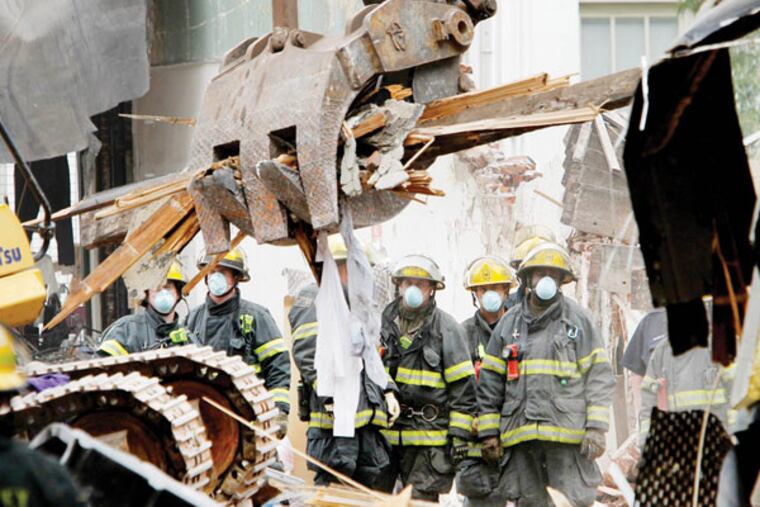OSHA: Deadly collapse was 'preventable'
Two Philadelphia contractors' "deliberate neglect" of basic demolition safety rules resulted in the Center City building collapse that killed six people in June, federal workplace regulators said Thursday.

Two Philadelphia contractors' "deliberate neglect" of basic demolition safety rules resulted in the Center City building collapse that killed six people in June, federal workplace regulators said Thursday.
The Occupational Safety and Health Administration announced fines totaling $397,000 against the two companies.
"Campbell Construction and S&R Contracting sacrificed worker and public safety through the deliberate neglect of demolition safety fundamentals. This tragic incident could and should have been prevented," said David Michaels, assistant U.S. secretary of labor for occupational safety and health. "We should not be here today."
Michaels also said the agency had begun discussions with the Justice Department about possible prosecutions, on top of a local grand-jury investigation that the District Attorney's Office initiated in June.
OSHA set penalties of $313,000 for Campbell and $84,000 for S&R. The companies have 15 business days to accept the findings and penalties or contest them before an independent federal panel.
A lawyer for Campbell, William Hobson, called OSHA's investigation "one-sided" and vowed to contest the findings. Daine A. Grey Jr., the lawyer for S&R owner Sean Benschop, could not immediately be reached for comment.
Michaels, announcing OSHA's findings Thursday in a conference call with reporters, said he realized the fines would provide "little comfort" to the collapse's victims and their families, but hoped the action would "send a message to employers in Philadelphia and elsewhere that cutting corners in safety will be punished."
Campbell's owner is Griffin Campbell, whose firm was hired to demolish a four-story building at 2136 Market St. owned by STB Investment Corp., controlled by real estate investor and would-be developer Richard Basciano. Campbell engaged Benschop to operate an excavator at the site.
On June 5, after most of the flooring inside the structure had been removed, a brick wall on the west side of the building collapsed onto an adjacent Salvation Army thrift shop, which had remained open during the demolition project. Six people inside the shop were killed and 14 others, including Benschop, were injured.
Asked by reporters if OSHA was conducting any separate investigations of the Salvation Army or Basciano, Michaels said, "There is a separate investigation for other entities." He did not elaborate.
Basciano and the Salvation Army have been named as defendants in civil lawsuits filed by victims and their families. Since the developer and the charity have deeper pockets than the two small contractors, their involvement will be a critical issue in resolving damage claims.
OSHA levied the maximum fine possible against the Campbell firm - $70,000 - for each of what regulators determined were three "willful violations" of basic safety requirements: failing to prepare an engineering study for the demolition project; disobeying a rule requiring higher stories to be removed before demolition begins on lower floors; and removing lateral bracing, provided by the floors, to support walls more than one story high.
Removal of lateral bracing is a safety breach so "egregious," OSHA regulators said, that the penalty was levied twice, for violations on two separate days.
Additional citations for hard-hat violations, inadequate fall protection, and stair inspections pushed Campbell's total fines to $313,000.
S&R was fined $84,000 for one "willful" violation of lateral bracing requirements, and two "serious" violations related to training and failure to protect employees from falls.
Campbell's attorney, Hobson, said, "We absolutely deny any and all of these violations." He said Campbell and Benschop had been unable to cooperate with the OSHA probe because of the need to protect their rights in the district attorney's grand-jury probe.
Inspectors from both OSHA and the city's Department of Licenses and Inspections had visited the Market Street site repeatedly while the demolition was underway, Hobson said, "and neither OSHA nor L&I ever shut down what was a safely-conceived demolition of the buildings. . . . But we can't participate in [the OSHA] investigation because we have a pending criminal investigation against us."
S&R's Benschop, who was operating heavy equipment when the wall collapsed and was among those injured that day, is already facing criminal charges - six counts of involuntary manslaughter and 13 of reckless endangerment. District Attorney Seth Williams' office brought the charges after Benschop's blood tested positive for marijuana. He was jailed three days after the collapse and remains there, unable to raise 10 percent of his $1.55 million bail.
OSHA's Philadelphia area director, Domenick M. Salvatore, made a related announcement Thursday - that his office and L&I are trying to develop "interagency collaboration" to improve oversight of construction activity throughout the city. No details were provided.
As the two contractors are small companies with slim assets, lawyer Robert Mongeluzzi, who represents families of two people who died in the collapse and six who were injured, said Thursday that the fines might never be collected. More important, he said, is "the factual underpinnings for the citations."
"This was not an unforeseeable catastrophe," Mongeluzzi said.